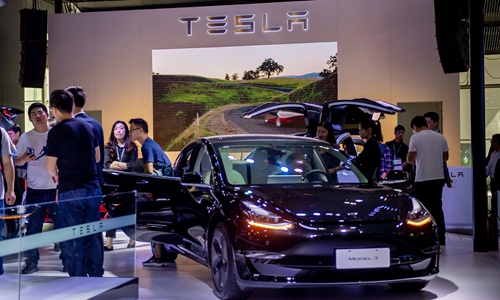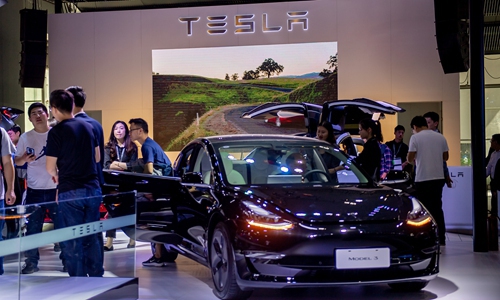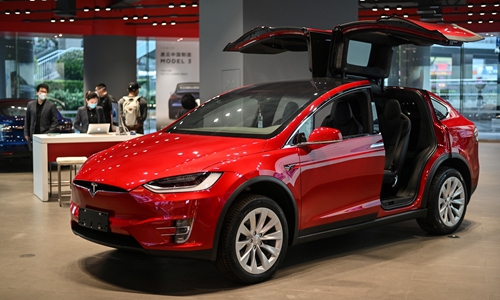
A Tesla Model 3 displayed at the Guangzhou Autoshow on November 22 Photo: VCG
Chinese netizens staged a heated debate after US electric carmaker Tesla terminated the contract of a client who took part in a promotional group purchase offered by Pinduoduo, one of China's largest e-commerce platforms known for team purchases.
In a follow-up on Friday, as the companies both issued strongly worded statements and Tesla terminated a sales contract with the buyer, a heavyweight consumer rights lawyer weighed in, saying that Tesla has violated the contract.
Qiu Baochang, a legal consultant at the China Consumers' Association, was quoted in a China National Radio interview as saying that Tesla might have violated article 49 of China's e-commerce law, which forbids e-commerce businesses to cancel a contract after a customer has made certain payments.
Zhao Zhanling, a legal counsel of the Beijing-based Internet Society of China, was quoted by in the same report as saying that Pinduoduo's involvement in the matter does not constitute "reselling" but is rather a means of paying for the car on customer's behalf.
Zhao said Tesla's contract did not forbid any third party from footing the bill for the purchase and the company should execute the contract.
Previously, Tesla said that it does not sell cars via third-party channels in China and that it has the right to unilaterally terminate any agreement with its customer in any resale.
Tesla later canceled a deal with a buyer from Wuhan, capital of Central China's Hubei Province, on the grounds that the car had been resold.
The buyer placed an order for a discounted Tesla Model 3 vehicle on e-commerce platform Pinduoduo, on which Yiauto, a Chinese car dealer group, announced the group buying promotion. The car purchased via Pinduoduo was considerably cheaper than Tesla's official channels.
However, a customer from Shanghai, who took part in the same promotion, successfully got a car on Sunday, according to media reports on Sunday.
Legal jargon aside, the case continued to grab the attention of Chinese netizens, who engaged in heated discussion over the weekend.
"It is understandable as Tesla wants to keep customers under its direct sales system," one netizen wrote. "The system may break down with subsidized offerings made by Pinduoduo that are presented as an alternative to cars sold under the normal channel."
"Pinduoduo is making a public relations stunt out of this, gaining a lot of consumer attention just by subsidizing the purchase of a few Tesla cars," another wrote.
According to an online poll of over 7,200 netizens by domestic media outlet Phoenix Weekly on China's twitter-like Weibo, 1,500 voted to support Tesla while 2,011 voted that the buyer should seek compensation from Pinduoduo. In the meantime, 2,312 supported Pinduoduo and 1,390 said they were watching the situation without choosing sides.
There were also comments criticizing Tesla for being arrogant toward a customer with its handling of the matter.
Liu Dingding, a Beijing-based internet analyst, told the Global Times that Tesla should thank Pinduoduo for "helping" to sell its cars.
"Has Pinduoduo disrupted Tesla's pricing system? I don't think so as Pinduoduo is the subsidy provider and does not ask Tesla to pay the bill," Liu said.
Zeng Zhiling, an analyst at Shanghai-based consultancy LMC Automotives, told the Global Times on Sunday that the company could be annoyed by the involvement of a third-party into its direct sales model that disrupted its pricing.
Given Tesla's track record of waging a series of legal battles to defend its direct sales business model in its US home market, it won't be surprising if the company chooses to settle the case in court here, Zeng said.




